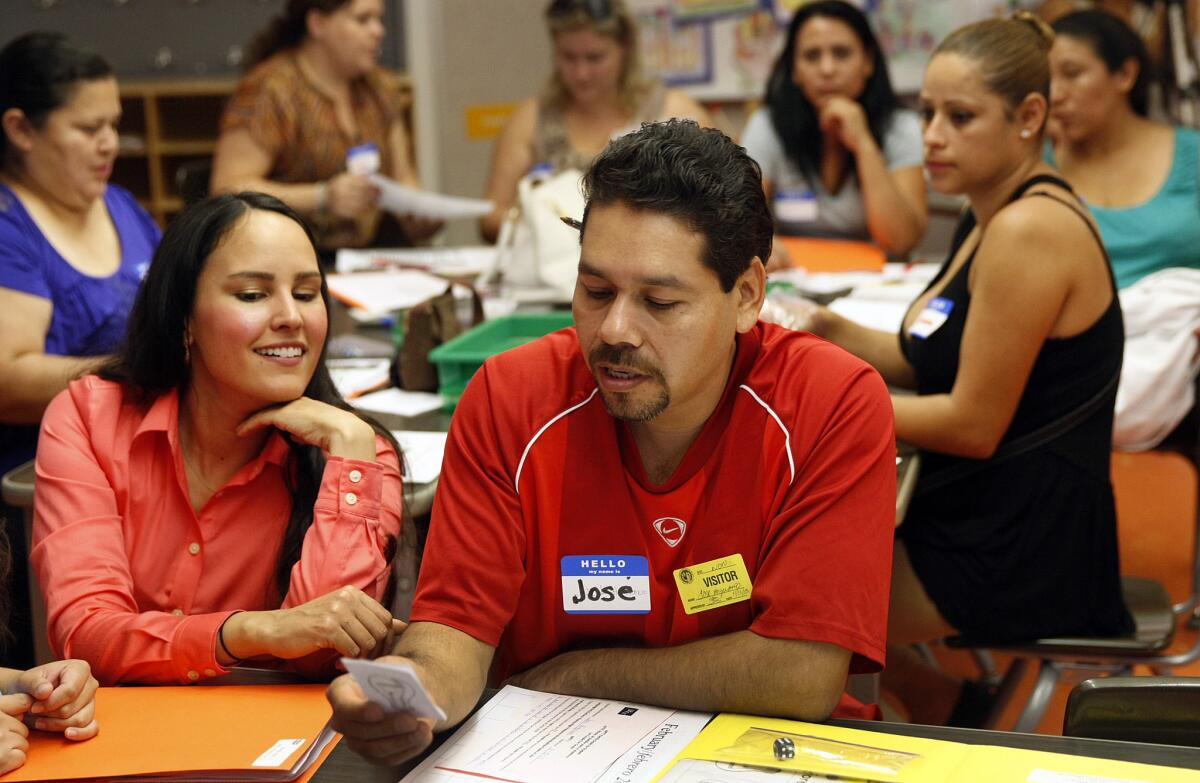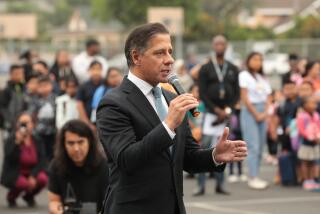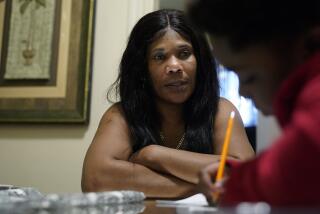How to actually get something out of parent-teacher conferences

- Share via
It’s that time of year. Kids have been in school for a while, and now you get about 15 minutes with their teacher to talk about ... what, exactly?
Parent-teacher conferences can be confusing. They’re rushed, with parents lingering to ask questions and more hovering at the door.
But education researchers say parental involvement and communication with teachers is an important element of student success. We talked to experts to find out why parent-teacher conferences are important and how parents can make the most of their time. These experts are listed at the end of the story.
What is a parent-teacher conference?
These meetings are mandated twice a year in “predominantly Hispanic, black, Asian, or other non-Anglo” (PHBAO) schools in L.A. Unified, which includes most schools in the district. The goal is for teachers to be able to talk to parents individually about their children’s progress and goals. It’s also an opportunity for parents to get to know the person teaching their kid, ask any questions they may have and bring up concerns in a one-on-one setting.
Parent-teacher conferences usually happen during the fall and again in the spring.
Should I go only if my child is having problems?
No. Even if your kid is performing perfectly, this is a good opportunity to share his or her interests with the teacher and look for more opportunities outside of the classroom, like clubs, tutoring or access to affordable study help outside of school. You also can ask the teacher about your child’s passions in the classroom.
How do I prepare?
Talk to your child. These conferences are short — they tend to be 10 to 20 minutes long at most, so it’s good to go in knowing what you want to glean from them. There are a few questions parents can ask their children to prepare beyond “How’s class?” and “How’s your teacher?”.
Below are some things you can talk about, and groups like the Harvard Family Research Project and a school district in Washington have even published preparation tip sheets:
Ask your child to teach you something that they learned in class; pay attention to what they are able to explain and what they have trouble with. Then ask what the most challenging part of teaching you is.
Ask them how well they can hear and see the teacher from where they’re sitting. Look at the work they’ve done, and the grades and comments they’re receiving.
LAUSD also holds workshops at schools’ parent centers to help prepare for parent-teacher conferences. Dates are available on school websites, or parents can call the school to find out where the closest center is.
What do I want to get out of this?
Come into the classroom with a positive and collaborative attitude — that’s the best way to get good results from a teacher. To demonstrate that you understand this is a partnership, ask how you can support your child’s learning at home.
Ask, “What classroom activities keep my child engaged in learning?” That question helps parents understand what the teacher does to make sure the student is actively engaged in learning, as opposed to passively sitting in class.
Ask “In particular, what strengths or interests has my child developed in your class?” That will tell you what classroom activities are supporting your child. The teacher also may have suggestions for ways to enhance that interest outside the classroom.
Is this the only time I can talk to a teacher?
No, of course not. Many experts say parent-teacher conferences should not be the first or the only time the two talk. Here is a different guide on how to talk to teachers.
Fifteen minutes is not a long time. Schools know that. You can always follow up with your child’s teacher to schedule a longer time to talk via email or phone.
How do these conferences change in different grades?
The ways to measure student progress change in different grades. For example, if your child has just started preschool or transitional kindergarten, you can ask the teacher which learning centers your child gravitates toward and whether he or she follows directions.
In higher grades, it’s good to start with academic progress and move on to interests. In high school, conversations can be more targeted toward the student’s college or career goals and what kind of classroom or extracurricular activities he or she needs to achieve those goals.
How are parent-teacher conferences different from back to school nights?
Back to school nights are for large groups of parents to learn what their child will learn this year. In LAUSD, back to school nights tend to focus on Common Core curriculum. This can be a good time to introduce yourself to a teacher, but one-on-one time is not built into the evenings.
What about translation?
Schools are required to offer a translator for parents, and this does not include your child, another child or untrained staff. This is a service for which parents have the right to ask.
Education Matters spoke to the following people for this story:
Diane Panossian, LAUSD administrator for Parent, Community and Student Services
Ruth Yoon, LAUSD administrator for Parent, Community and Student Services
Heather Weiss, founder and director of the Harvard Family Research Project
Elena Lopez, associate director at Harvard Family Research Project
Alexis Holmes, senior policy analyst at the National Education Association
Tanya Anton, education consultant and Go Mama Guide founder
Trise Moore, Federal Way Public Schools district Family and Community Partnership director
Sandra Gutierrez, national director of Abriendo Puertas
More to Read
Sign up for Essential California
The most important California stories and recommendations in your inbox every morning.
You may occasionally receive promotional content from the Los Angeles Times.











